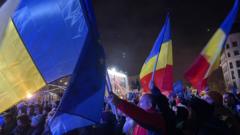The recent decision by Romania's constitutional court to annul the presidential election ahead of a planned run-off has placed the country on uncertain electoral ground. Just 48 hours before voting was set to commence, the court intervened based on alarming revelations that implicated foreign powers, particularly Russia, in influencing the electoral process.
Calin Georgescu, an independent far-right candidate, emerged as a surprising frontrunner in the first round of voting, generating controversy amid claims of an orchestrated social media campaign backed by foreign entities. Following the declassification of intelligence documents by outgoing President Klaus Iohannis, it was revealed that numerous social media accounts, purportedly connected to Russian influence, had been mobilized to support Georgescu's candidacy, raising serious questions about the legitimacy of the election.
The court's ruling, described as unprecedented, annulled the results of the initial round, forcing the Romanian government to schedule a re-run, with the potential for a significant delay in the voting process. Romanian intelligence agencies have echoed concerns about Russian meddling, likening it to similar events in neighboring Moldova and Georgia.
Georgescu, who denounced the court's ruling as a political coup, reflects a nationalist sentiment within Romania, encapsulated by his calls for reducing foreign presence and aid. His controversial perspectives have sparked a divide among Romanians, with some viewing the court's decision as an affront to democracy while others support the call for renewed elections to ensure fairness in the political landscape.
Many citizens are weighing the implications of this annulment on Romania’s democratic integrity, especially as the country is situated at a crucial geopolitical juncture in Eastern Europe, bordering Ukraine. Observers are left pondering whether past electoral grievances will resurface as signing factions prepare for renewed campaigning.
The political landscape remains uncertain as Romania anticipates a re-run of elections in the coming months while navigating profound societal divisions and the potential for unrest among Georgescu's supporters. As the nation gears for this unprecedented electoral challenge, the future trajectory of Romanian democracy hangs in the balance.
Calin Georgescu, an independent far-right candidate, emerged as a surprising frontrunner in the first round of voting, generating controversy amid claims of an orchestrated social media campaign backed by foreign entities. Following the declassification of intelligence documents by outgoing President Klaus Iohannis, it was revealed that numerous social media accounts, purportedly connected to Russian influence, had been mobilized to support Georgescu's candidacy, raising serious questions about the legitimacy of the election.
The court's ruling, described as unprecedented, annulled the results of the initial round, forcing the Romanian government to schedule a re-run, with the potential for a significant delay in the voting process. Romanian intelligence agencies have echoed concerns about Russian meddling, likening it to similar events in neighboring Moldova and Georgia.
Georgescu, who denounced the court's ruling as a political coup, reflects a nationalist sentiment within Romania, encapsulated by his calls for reducing foreign presence and aid. His controversial perspectives have sparked a divide among Romanians, with some viewing the court's decision as an affront to democracy while others support the call for renewed elections to ensure fairness in the political landscape.
Many citizens are weighing the implications of this annulment on Romania’s democratic integrity, especially as the country is situated at a crucial geopolitical juncture in Eastern Europe, bordering Ukraine. Observers are left pondering whether past electoral grievances will resurface as signing factions prepare for renewed campaigning.
The political landscape remains uncertain as Romania anticipates a re-run of elections in the coming months while navigating profound societal divisions and the potential for unrest among Georgescu's supporters. As the nation gears for this unprecedented electoral challenge, the future trajectory of Romanian democracy hangs in the balance.


















